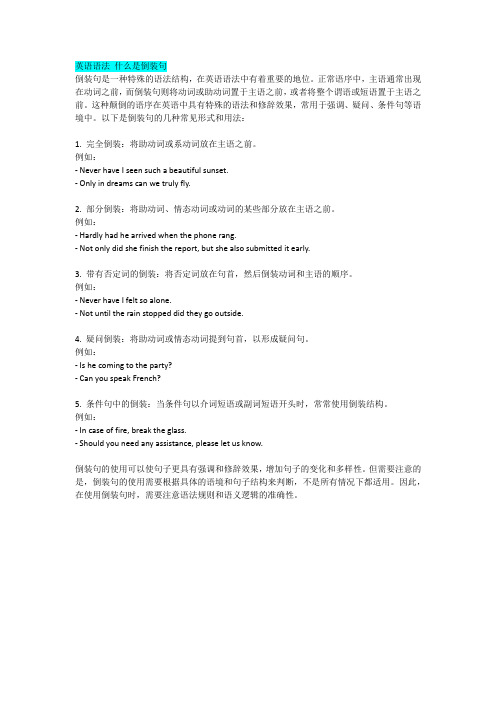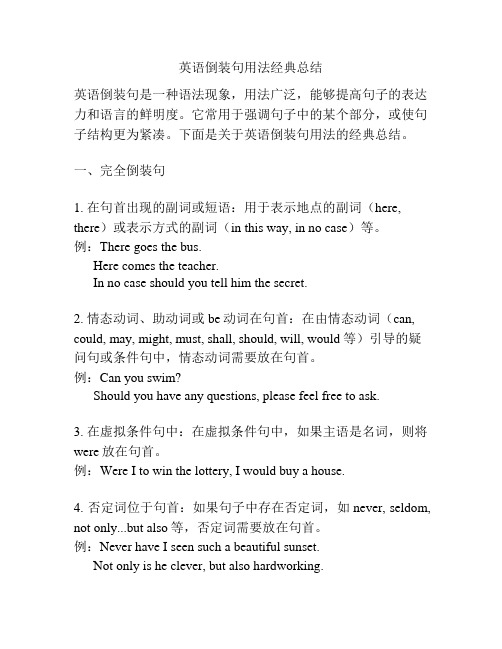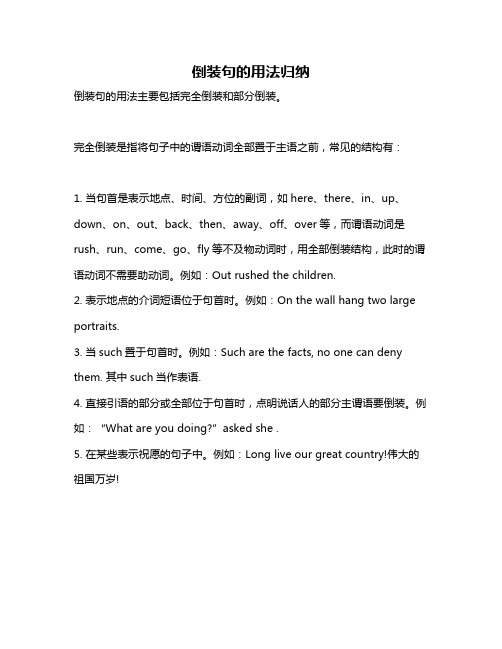英语里倒装句的用法
- 格式:docx
- 大小:12.45 KB
- 文档页数:2

倒装句的作用倒装句是英语语法中的一种句子结构,在倒装句中,谓语动词和主语的顺序颠倒。
倒装句可以用于肯定句、否定句、疑问句以及特殊情况下的特殊句型。
倒装句有着多种作用和功能,以下是其中一些常见的作用和用法。
1.强调句首成分倒装句可以通过将句子的主语、状语或其他成分置于句首来实现强调的效果。
例如:- "Not only did she finish the project on time, but she also exceeded our expectations."(她不仅按时完成了项目,还超出了我们的预期。
)- "Here comes the bus!"(车来了!)在这些例子中,倒装句用于强调句子中的某个成分,使其更加突出。
2.表示条件在表示条件的句子中,一般会采用倒装结构,将条件状语从句的谓语动词提前。
例如:- "Should you have any questions, feel free to ask."(如果你有任何问题,请随时问。
)- "Had he worked harder, he would have passed the exam."(如果他努力学习,他就能通过考试。
)这种倒装句结构可以使条件更加突出和强调。
3.疑问句在一般疑问句中,动词通常要倒装到主语的前面。
例如:- "Do you like to travel?"(你喜欢旅行吗?)- "Have you finished your homework?"(你完成作业了吗?)倒装句的疑问形式使得问题更加明确,语气更加直接。
4.特殊句型倒装句也用于特殊句型中,例如:- “So +助动词/情态动词+主语”:"So did I."(我也是。
)- “Neither/nor +助动词/情态动词+主语”:"Neither do I."(我也不。

倒装句的构成和用法倒装句是英语中一种常见的语法现象,它与正常语序不同,通常是将谓语动词或助动词置于主语之前,从而实现语序的倒装。
倒装句在表达特定的语境和意义时非常有用,下面将详细介绍倒装句的构成和用法。
一、完全倒装句完全倒装句是最基本的倒装结构,通常在以下情况下使用:1. 当以副词或介词短语开头时:例句:In the middle of the room stood a large, beautiful vase.On the top of the mountain live a group of endangered birds.2. 在某些句型中,如否定词+名词短语开头,或者表示方位的副词短语开头:例句:Never have I seen such a beautiful sunset.Under no circumstances should you give up.3. 在某些条件句中,以"had"开头:例句:Had I known about the party, I would have come earlier.二、部分倒装句部分倒装句是将助动词或情态动词置于主语之前,形成倒装结构,通常用于以下情况:1. 在一般疑问句中,助动词置于主语之前:例句:Do you like coffee?Can she speak French fluently?2. 在以"not only...but also"结构引导的句子中:例句:Not only did he win the race, but he also broke the record.3. 在以"so"或"neither"开头的句子中,表示对前面所说的情况进行转折或承认:例句:So beautiful is the scenery that it takes my breath away.She doesn't like spicy food, and neither do I.三、倒装句的用法倒装句在英语中广泛应用,具有以下几种常见的使用方式:1. 强调句:通过将助动词置于主语之前,强调句子中的某个成分,使其更加突出。

英语倒装句语法总结英语倒装句是一种句法结构,它通过将主语和助动词的位置颠倒,以实现强调、表示条件或修饰的功能。
倒装句在英语中常常用于口语和书面语中,给文本增加了一定的变化和兴趣。
在本文中,将对英语倒装句进行详细总结,以便读者更好地理解和运用这一语法结构。
一、完全倒装句在完全倒装句中,整个谓语动词位于主语之前,这种倒装句一般用于以下几种情况:1. 当以“here”、“there”、“now”或表示地点、时间的副词开头的句子时,倒装句常被使用。
例如:Here comes the bus.There goes John.Now is the time for action.2. 在以表示否定意义的副词或短语开头的句子中,倒装句也常见。
例如:Never have I seen such a beautiful sunset.Not only is she talented, but she is also kind-hearted.3. 在以“only”开头修饰状语从句的句子中,倒装句也经常使用。
例如:Only when you face your fears can you overcome them.Only in this way can the problem be solved.二、部分倒装句部分倒装句中,只将助动词或情态动词放在主语之前,而将主语与谓语动词的位置维持原状。
部分倒装句常用于以下几种情况:1. 当以否定副词“never”、“seldom”或“rarely”开头时,部分倒装句可以被采用。
例如:Never have I been so happy.Seldom does he complain about anything.2. 在以“so”或“such”引导的句子中,为了表达强调,可以使用部分倒装句。
例如:So tired was she that she fell asleep on the couch.Such is the power of love that it can conquer all obstacles.3. 在以“not”开头的句子中,为了增强否定的语气,常常使用部分倒装句。

英语语法什么是倒装句倒装句是一种特殊的语法结构,在英语语法中有着重要的地位。
正常语序中,主语通常出现在动词之前,而倒装句则将动词或助动词置于主语之前,或者将整个谓语或短语置于主语之前。
这种颠倒的语序在英语中具有特殊的语法和修辞效果,常用于强调、疑问、条件句等语境中。
以下是倒装句的几种常见形式和用法:1. 完全倒装:将助动词或系动词放在主语之前。
例如:- Never have I seen such a beautiful sunset.- Only in dreams can we truly fly.2. 部分倒装:将助动词、情态动词或动词的某些部分放在主语之前。
例如:- Hardly had he arrived when the phone rang.- Not only did she finish the report, but she also submitted it early.3. 带有否定词的倒装:将否定词放在句首,然后倒装动词和主语的顺序。
例如:- Never have I felt so alone.- Not until the rain stopped did they go outside.4. 疑问倒装:将助动词或情态动词提到句首,以形成疑问句。
例如:- Is he coming to the party?- Can you speak French?5. 条件句中的倒装:当条件句以介词短语或副词短语开头时,常常使用倒装结构。
例如:- In case of fire, break the glass.- Should you need any assistance, please let us know.倒装句的使用可以使句子更具有强调和修辞效果,增加句子的变化和多样性。
但需要注意的是,倒装句的使用需要根据具体的语境和句子结构来判断,不是所有情况下都适用。
因此,在使用倒装句时,需要注意语法规则和语义逻辑的准确性。

英语倒装句用法经典总结英语倒装句是一种语法现象,用法广泛,能够提高句子的表达力和语言的鲜明度。
它常用于强调句子中的某个部分,或使句子结构更为紧凑。
下面是关于英语倒装句用法的经典总结。
一、完全倒装句1. 在句首出现的副词或短语:用于表示地点的副词(here, there)或表示方式的副词(in this way, in no case)等。
例:There goes the bus.Here comes the teacher.In no case should you tell him the secret.2. 情态动词、助动词或be动词在句首:在由情态动词(can, could, may, might, must, shall, should, will, would等)引导的疑问句或条件句中,情态动词需要放在句首。
例:Can you swim?Should you have any questions, please feel free to ask.3. 在虚拟条件句中:在虚拟条件句中,如果主语是名词,则将were放在句首。
例:Were I to win the lottery, I would buy a house.4. 否定词位于句首:如果句子中存在否定词,如never, seldom, not only...but also等,否定词需要放在句首。
例:Never have I seen such a beautiful sunset.Not only is he clever, but also hardworking.5. Only修饰副词、介词短语或状语从句时:当only修饰副词、介词短语或状语从句时,倒装现象会出现。
例:Only in this way can we solve the problem.Only when he arrived did she start to cook.6. 某些表示条件的介词短语:由in case, in the event that或on condition等表示条件的介词短语引导的句子中,介词短语需要放在句首。

倒装句的用法归纳
倒装句的用法主要包括完全倒装和部分倒装。
完全倒装是指将句子中的谓语动词全部置于主语之前,常见的结构有:
1. 当句首是表示地点、时间、方位的副词,如here、there、in、up、down、on、out、back、then、away、off、over等,而谓语动词是rush、run、come、go、fly等不及物动词时,用全部倒装结构,此时的谓语动词不需要助动词。
例如:Out rushed the children.
2. 表示地点的介词短语位于句首时。
例如:On the wall hang two large portraits.
3. 当such置于句首时。
例如:Such are the facts, no one can deny them. 其中such当作表语.
4. 直接引语的部分或全部位于句首时,点明说话人的部分主谓语要倒装。
例如:“What are you doing?”asked she .
5. 在某些表示祝愿的句子中。
例如:Long live our great country!伟大的祖国万岁!
部分倒装是指将谓语的一部分如助动词或情态倒装至主语之前。
如果句中的谓语没有助动词或情态动词,则需添加助动词do, does或did,并将其置于主语之前。
以上信息仅供参考,如有需要,建议查阅语法书籍或咨询英语教师。
英语倒装句的用法归纳一、倒装句的定义英语倒装句是一种语法结构,其中谓语动词的位置放在了主语之前。
这种语法现象在英语中比较常见,尤其是在某些句型和表达方式中。
二、倒装句的分类1.全倒装句:谓语动词完全放在主语之前,有时需要助动词的帮助,如be、have、can等。
2.部分倒装句:只有部分谓语动词放在主语之前,通常是助动词、情态动词或系动词。
三、倒装句的用法1.用于强调:在某些情况下,使用倒装句可以强调谓语动词或表达方式。
例如:Here comes the bus!(公交车来了!)强调“公交车”即将到来。
2.用于疑问句:在疑问句中,通常使用倒装句来重新排列句子结构。
例如:Do you like music?(你喜欢音乐吗?)3.用于条件状语从句:在条件状语从句中,可以使用倒装句来表示与主句的对比或强调。
例如:If only I were a millionaire!(如果我是个百万富翁就好了!)4.用于让步状语从句:在让步状语从句中,可以使用倒装句来表示转折关系。
例如:Try to find a way to solve the problem!(试着找到解决问题的方法!)5.用于虚拟语气:在虚拟语气中,可以使用倒装句来表示与实际情况相反的情况。
例如:If I were you,I would go to the party.(如果我是你,我会去参加派对。
)6.用于某些固定句型:有些固定句型要求使用倒装句。
例如:“Hardly had she sat down when the phone rang.”(她刚坐下电话就响了。
)7.表示惊讶、感叹、讽刺等情绪时也可以使用倒装句。
例如:How could you do such a thing!(你怎么能做出这种事!)四、倒装句的用法归纳总结1.英语倒装句是一种语法结构,主要有全倒装句和部分倒装句两种类型。
2.使用倒装句可以强调谓语动词或表达方式,也可以用于疑问句、条件状语从句、让步状语从句和虚拟语气等语法结构中。
高中英语知识点归纳倒装句的用法倒装句是英语中的一种常见语法现象,它与一般的语序有所不同。
在倒装句中,谓语动词不再位于句子的中间,而是移到主语之前或状语之前,这种语法结构的运用可以使句子显得更加生动有趣。
下面将对高中英语中常见的倒装句进行归纳总结。
一、完全倒装句完全倒装句是指将助动词、情态动词或系动词放在主语之前,句子的谓语动词则位于主语之后。
完全倒装句的结构为:助动词/情态动词/系动词+主语+谓语动词+其他。
1.助动词完全倒装句助动词包括be动词、have动词和do动词。
当句子以副词here、there或表示方向的副词(如up、down、in、out等)开头时,为了突出地点或方向,可以采用助动词完全倒装的形式。
例如:Here comes the bus.There is a cat under the table.Down came the rain.2.情态动词完全倒装句情态动词包括can、could、may、might、must、shall、should、will、would等。
在表示祝愿、建议、命令等意义时,可以采用完全倒装的形式。
例如:May you have a happy birthday!Should you need any help, feel free to ask.Will you please close the door?3.系动词完全倒装句系动词包括be动词、seem、appear、look、sound等。
在表示位置、方式、状态、主语特征等方面时,可以采用系动词完全倒装的形式。
例如:On the table lies a book.How beautiful the flowers are!Tired as he was, he kept working.二、部分倒装句部分倒装句是指将谓语动词的一部分(通常是助动词或情态动词)与主语之间的位置对调,这种语法结构常见于否定句、选择疑问句和以感叹词开头的句子。
英语倒装句用法经典总结1.完全倒装句:主语和谓语动词完全倒置。
如:- Never have I seen such a beautiful sunset.(我从未见过如此美丽的日落。
)- Little did he know about the problem.(他对问题一无所知。
)2.部分倒装句:只将助动词或情态动词和主语进行倒置。
如:- Can you swim?(你会游泳吗?)- Should you have any questions, please let me know.(如果你有任何问题,请告诉我。
)3.如果句子以表示地点的副词或介词短语开头,也需要进行倒装。
如:- On the top of the mountain stood a small cabin.(在山顶上有一间小木屋。
)4.如果句子以表示否定意义的副词或介词短语开头,也需要进行倒装。
如:- Under no circumstances will I allow that to happen.(无论如何,我都绝不容许那种事情发生。
5. 在条件句中,如果主语和谓语动词之间使用“had”,“were”或“should”时,需要进行倒装。
如:- Had I known it earlier, I would have prepared better.(要是早知道这个,我会准备得更好。
)- Were I you, I would apologize.(要是我是你,我会道歉。
)以上是英语倒装句的几种常见用法,不同的倒装句用法可以根据具体的语境和语法规则进行灵活运用。
英语倒装句的使用方法倒装句在英语语法中是一个重要的结构,它可以改变句子的语序,使得表达更加生动、强调更为突出。
本文将介绍英语倒装句的使用方法,帮助读者理解并正确运用这一语法结构。
一、倒装句的基本形式倒装句的基本形式是将谓语动词的助动词或情态动词置于主语之前,可以用于陈述句、疑问句和条件句中。
以下是一些常见的倒装句的形式:1. 完全倒装:将助动词或情态动词置于主语之前,主语紧随在后。
例句1:Never have I seen such a beautiful sunset.例句2:Not only does she speak English fluently, but she also speaks French.2. 部分倒装:只将谓语动词的助动词或情态动词置于主语之前。
例句1:Have you finished your homework?例句2:Can she play the piano?二、倒装句的用法及注意事项1. 当句子以表示地点、方向、方式等的副词或短语开头时,可以使用完全倒装。
例句1:Under the tree sat a group of children, laughing and chatting.例句2:On the top of the hill stands a lonely house.2. 在表示否定意义的副词或词组在句首时,可以使用完全倒装。
例句1:Not only did he fail the exam, but he also lost his scholarship.例句2:Never have I been so disappointed.3. 在条件句中,为了强调条件而将“if”或“unless”置于句首时,可以使用完全倒装。
例句1:Should you need any assistance, please do not hesitate to contact us.例句2:Were it not for her guidance, I would not have succeeded.4. 在一些固定的短语或句型中,也常常使用倒装句。
英语里倒装句的用法
英语倒装句的用法英语倒装句是英语中很重要的一种句型,难度相对也有点大。
你掌握了吗。
接下来小编在这里给大家带来英语倒装句的用法,我们一起来看看吧!
英语倒装句的用法
英语中常见的倒装:
1. 在疑问句中。
Did you had your hair cut yesterday?
2. 在there be 结构中。
There are several students in the classroom.
3. 直接引语的一部分或全部放在句首时,有时也用倒装。
" Build up your self-confidence."; said the teacher.
4. 在表示方向,地点的副词或某些介词词组开头的里,如there, here, out, in, up, down, away, in front of等,以示强调。
On the top of the hill stands an old temple.
Away flew the bird.
Out rushed the pupils.
但主语是人称代词时,主语和谓语的语序不变。
Here it is.
Away he went.
5. 含有否定意义的副词或连词,如never, not, not only, little, seldom, hardly等,放在句首时。
Not only am l out-going and active, but also enthusiastic and optimistic.
Never will he forget the first day to go to school.
Hardly had I got out of the house when it began to rain.
基本语序
6. Only 所修饰的副词,介词短语或状语从句放在句首时。
Only in this way can you have a good command of a foreign language.
Only if you put your mind into something can you get the best result of it.
7. So , neither, nor引起的句子,表示前面的情况也适用于另一个人或事物时。
His parents have gone abroad. So has he.
George doesn’t like animals and neither does his sister.
8. 在so/ such...that结构中,so和such 放在句首时。
So absorbed was he in the novel that he didn’t notice his father at the door.
So proud was he that he never listened to any advice.
9. 在表示祝愿的句子中。
May you succeed!
Long live the PRC!
10. 虚拟条件从句省去if时。
Had Mark invited me, I would have been glad to come.
= If Mark had invited me, I would have been glad to come.
英语倒装句的例句
⒈疑问句,如:
● Can you do it? ● How old are you? ● When did you know him?
● Why did you elect him as captain? ● Which of these apples do you prefer?
但疑问代词做主语时,不必倒置,如:
● Who is your English teacher? ● What happened last night?
⒈表示"愿望";的句子,如:
● May God bless you. ● Long live the king!
⒈"There";引导的句子,如:
● There are many cars on the road. ● There stand some big trees near the river.
● There is a security guard outside the bank.
⒈感叹句,如:
● How beautiful the flower is! ● What a smart boy you are!
⒈有连接词"so, neither, nor";的句子,如:
● Tom can ride a bicycle; so can I. ● She can' t sing; neither can he.
● John has never been late; nor have I.
⒈省略连词"if";的条件副词分句,如:
● Were I you, I would not do such a thing.
● Should the machine break down again, send it back to us.
● Had you worked harder, you would have passed.
⒈"as, however";连接的让步副词分句,如:
● Small as the pen is, it is a powerful weapon.
● However busy you are, you should spend some time reading Zaobao weekly.
二、强调的倒装句,如:
● Never have I seen such a wicked man.
● On no account must this employee be removed.
● Not until he told me had I heard anything of it.
● No sooner had I left than the rain came.
● Up jumped the puppy.
● In came John.
● Down fell the rotten branches from the tree.
● Out came a woman and her maid.。